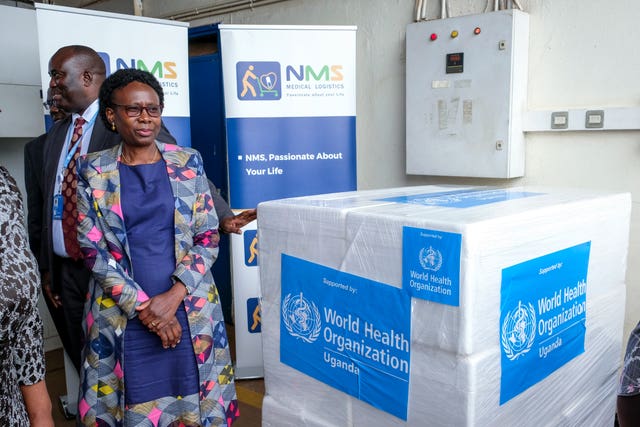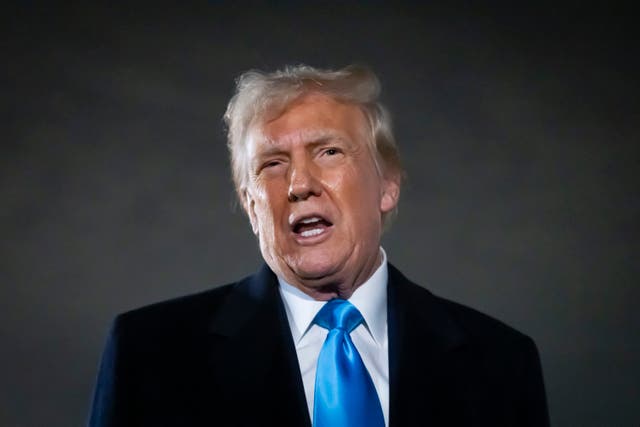The World Health Organisation (WHO) chief has asked global leaders to lean on Washington to reverse President Donald Trump’s decision to withdraw from the UN health agency.
Countries also pressed WHO at a key budget meeting about how it might cope with the exit of its biggest donor, according to internal meeting materials obtained by The Associated Press.
German envoy Bjorn Kummel warned: “The roof is on fire, and we need to stop the fire as soon as possible.”
.@DrMikeRyan is in #Uganda to reinforce @WHO‘s support for the government’s Sudan #Ebola virus response. He met with the Health Minister and her Strategic Advisory Group of experts to review outbreak containment measures.
He also met with the @UN Resident Coordinator, UN and… pic.twitter.com/wkAtZvOG2n
— Tedros Adhanom Ghebreyesus (@DrTedros) February 1, 2025
For 2024-2025, the US is WHO’s biggest donor by far, putting in an estimated 988 million dollars (£803 million), roughly 14% of the WHO’s budget.
A budget document presented at the meeting showed WHO’s health emergencies program has a “heavy reliance” on American cash. “Readiness functions” in WHO’s Europe office were more than 80% reliant on the 154 million dollars (£125 million) the US contributes.
The document said US funding “provides the backbone of many of WHO’s large-scale emergency operations,” covering up to 40%.
It said responses in the Middle East, Ukraine and Sudan were at risk, in addition to hundreds of millions of dollars lost by polio eradication and HIV programs.
The US also covers 95% of WHO’s tuberculosis work in Europe and more than 60% of TB efforts in Africa, the Western Pacific and at the agency headquarters in Geneva, the document said.
At a separate private meeting on the impact of the US exit last Wednesday, WHO finance director George Kyriacou said if the agency spends at its current rate, the organisation would “be very much in a hand-to-mouth type situation when it comes to our cash flows” in the first half of 2026.

Since Mr Trump’s executive order, WHO has attempted to withdraw funds from the US for past expenses, Mr Kyriacou said, but most of those “have not been accepted.”
The US also has yet to settle its owed contributions to WHO for 2024, pushing the agency into a deficit, he added.
Last week, officials at the US Centre for Disease Control and Prevention were instructed to stop working with WHO immediately.
WHO director-general Tedros Adhanom Ghebreyesus told the attendees at the budget meeting that the agency is still providing US scientists with some data — though it is not known what data.
“We continue to give them information because they need it,” Mr Tedros said, urging member countries to contact US officials.
“We would appreciate it if you continue to push and reach out to them to reconsider.”
Among other health crises, WHO is working to stop outbreaks of Marburg virus in Tanzania, Ebola in Uganda and mpox in Congo.
Mr Tedros rebutted Mr Trump’s three stated reasons for leaving the agency in the executive order signed on January 20 — Mr Trump’s first day back in office. In the order, the president said WHO mishandled the COVID-19 pandemic that began in China, failed to adopt needed reforms and that US membership required “unfairly onerous payments.”

Mr Tedros also said he believed the US departure was “not about the money” but more about the “void” in outbreak details and other critical health information that the United States would face in the future.
“Bringing the US back will be very important,” he told meeting attendees. “And on that, I think all of you can play a role.”
Mr Kummel, a senior advisor on global health in Germany’s health ministry, described the US exit as “the most extensive crisis WHO has been facing in the past decades.”
He also asked: “What concrete functions of WHO will collapse if the funding of the US is not existent anymore?”
Officials from countries including Bangladesh and France asked what specific plans WHO had to deal with the loss of US funding and wondered which health programs would be cut as a result.
The AP obtained a document shared among some WHO senior managers that laid out several options, including a proposal that each major department or office might be slashed in half by the end of the year.
WHO declined to comment on whether Mr Tedros had privately asked countries to lobby on the agency’s behalf.






